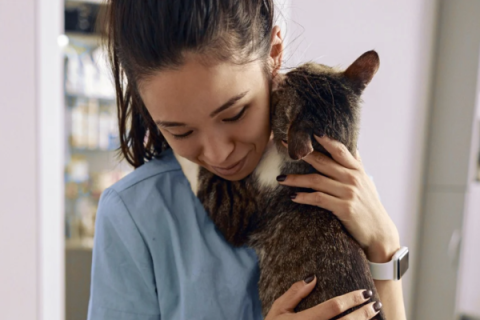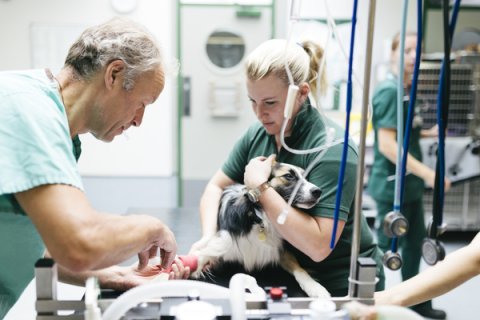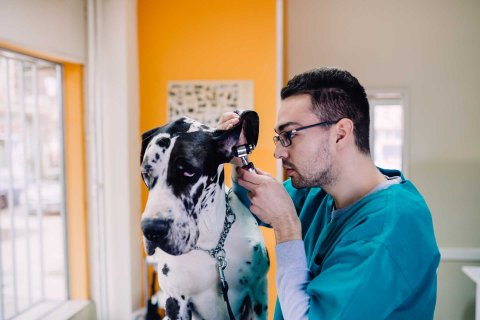Studying veterinary science is a commitment to safeguarding the health and welfare of animals, opening up many exciting career paths. As well as equipping you to nurture and heal our furry, feathered, and scaly friends, studying veterinary science can lead to many professional routes.
There are the traditional roles such as clinical practice, where you become trusted healers for pets and livestock, as well as emerging fields like veterinary research, contributing to groundbreaking discoveries. You can also explore opportunities in wildlife conservation, public health, pharmaceuticals, and even education if you’re passionate about the crossover between animal and human wellbeing.
As society places an increasing emphasis on animal care and ethical treatment, the demand for skilled veterinarians continues to grow, making this route not only fulfilling but also promising in terms of long-term career growth and positive impact.
The impact you could make
- Promote the wellbeing of animals, ecosystems, and even public health.
- Contribute to wildlife conservation efforts.
- Create lasting positive effects on the health of our planet and its diverse inhabitants.
What you could study
- Animal behaviour
- Animal handling
- Veterinary anatomy and physiology
- Zoological medicine
- Veterinary practical techniques
- Infectious diseases
- Wildlife conservation
Example module
Example assignment
85% of students
Subjects it's useful to have studied first
Some veterinary science courses or apprenticeships will have requirements for previous qualifications in certain subjects. Entry requirements vary, so always check with the provider.
English
Maths
Biology
Hard skills you'll develop
- Interpret diagnostic tests
- Hands-on skills in surgical procedures
- Various laboratory skills, such as conducting blood tests Maintaining accurate and detailed medical records
- Respond to and manage emergency situations
Soft skills you'll develop
- Adaptability in response to evolving veterinary practices
- Empathy for both animal patients and their owners
- Ability to make quick and sound decisions
- Learn to handle high-pressure situations
- Strong sense of ethical responsibility and integrity
Careers: Where it can take you
Find out more about your career prospects from studying veterinary science. The following information is based on a typical veterinary science professional role.
Available jobs
Average salary
Career options
Agriculture and animal care
Agriculture and the environment

What is a… wildlife veterinarian and conservationist
These professionals work on the front line of wildlife preservation, combining their medical expertise with a passion for biodiversity and environmental conservation. Wildlife veterinarians may find themselves involved in activities such as field research, conservation medicine, rescue and rehabilitation, education and advocacy, and zoo and exotic animal medicine.
The variety in this profession makes it a fascinating and impactful career choice for anyone passionate about animals and the environment.

Find your ideal career
Take our careers quiz to find your ideal job matched to your personality type.Getting in: Entry requirements
Find out more about what you'll need to study veterinary science at university or as an apprenticeship.
Average requirements for undergraduate degrees
Entry requirements differ between university and course, but this should give you a guide to what is usually expected from veterinary science applicants.
A levels
Scottish
Vocational

Agriculture, environmental, and animal care apprenticeships
Check out our industry guide to help you decide if an apprenticeship might be the right choice for you.
Other subjects you may be interested in
Considering an apprenticeship?
Applying for an apprenticeship is just like applying for a normal job. Here’s what you need to know:-
1
Deadline
Apprenticeships don't follow the same deadlines as applying to uni, the deadline is down to the employer. -
2
Where to apply
You apply directly through the employer. -
3
No limits
You're not restricted to one apprenticeship application; you can do as many as you like. -
4
Apply to university and apprenticeships
There's nothing stopping you applying to university through UCAS, while also applying for apprenticeship vacancies. -
5
Find out more

Apprenticeship vacancies
Check out live apprenticeship vacancies in agriculture, animals, horticulture, and the environment.
Explore further
Go deeper into topics around veterinary science with the following:-
1
The Yorkshire Vet
Watch the TV series to see real vets caring for animals in rural Yorkshire. -
2
The Royal College of Veterinary Surgeons
Visit the RCVS website – setting, upholding and advancing the educational, ethical and clinical standards of veterinary surgeons and veterinary nurses. -
3
Animal charities
Follow animal charities such as the RSPCA, Blue Cross and PDSA to keep up-to-date with animal welfare concerns.
Application advice
Whether it's personal statement tips or what to write in a cover letter for an apprenticeship application, our application advice will help you get ahead in your veterinary science journey.Skills, experiences, and interests to mention
- Have you got experience of working with animals, such as experience of working on farms, in kennels, stables, veterinary practices, or rescue centres?
- Are you well informed and passionate about veterinary science, both as a subject and as a future career?
- Can you explain why you think animal welfare and care is an important issue?
- How can you demonstrate your empathy and compassion through the experiences you’ve had?
- Your science grades, particularly in biology, will be really important in your personal statement.

Personal statement guide
We asked admissions tutors to share their dos and don’ts for writing a strong and engaging veterinary science personal statement. Here's what they told us.













